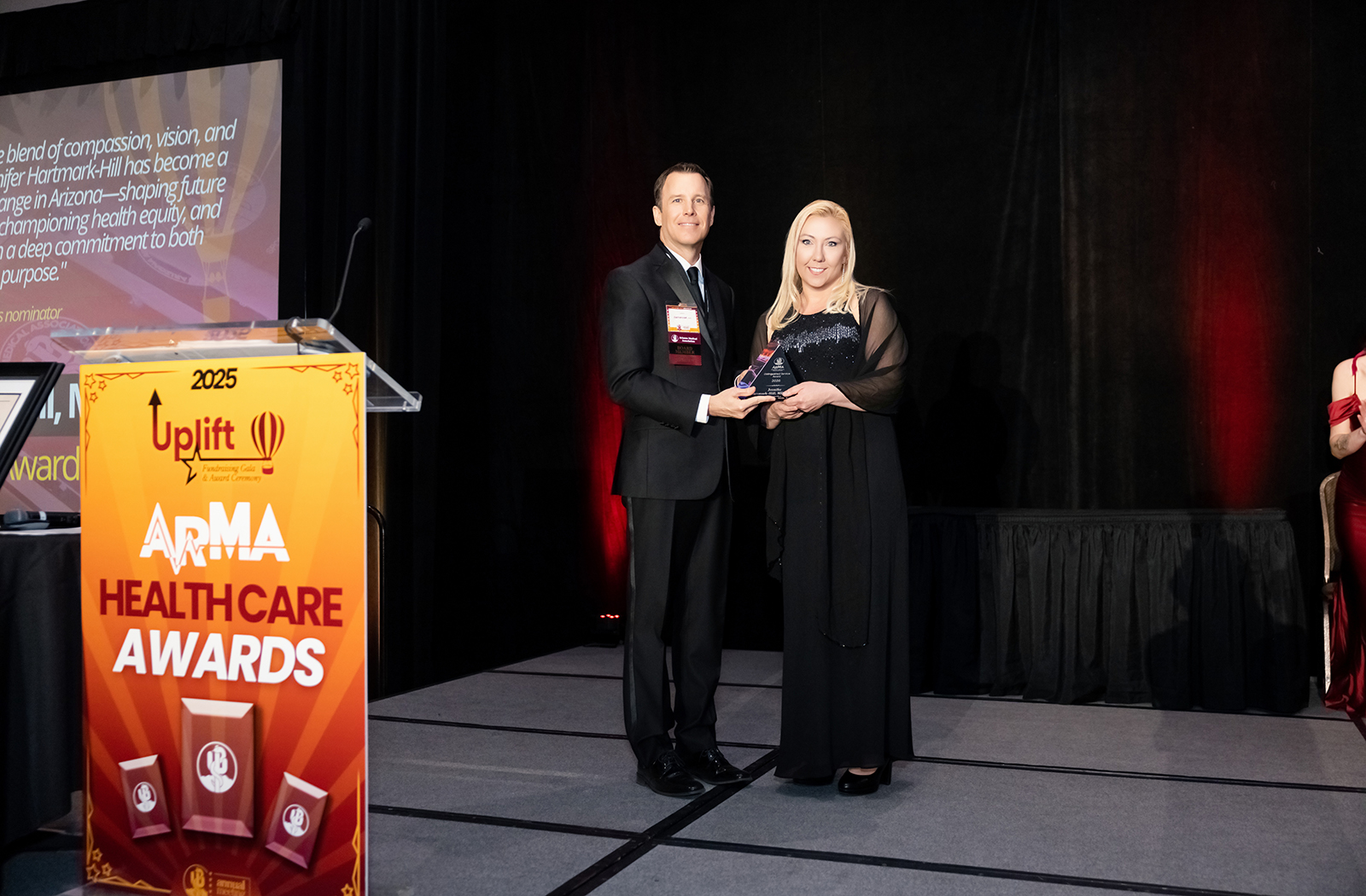
Jennifer Hartmark-Hill, MD, Honored at the ArMA Health Care Awards

Saturday, April 5, the Arizona Medical Association (ArMA) hosted the Uplift Fundraising Gala and recognized Jennifer R. Hartmark-Hill, MD, FAAFP, director for the Narrative Medicine and Health Humanities Program at the University of Arizona College of Medicine – Phoenix, as one of the recipients for its 2025 ArMA Health Care Awards.
Dr. Hartmark-Hill received the Distinguished Service Award, which is the organization’s highest honor reserved for those who have demonstrated unparalleled excellence, dedication and leadership in medicine. It is also the final award presented at the gala.
Jason Jameson, MD, president-elect for ArMA, spoke of Dr. Hartmark-Hill’s career being a testament to the profound impact a dedicated physician can have on patients, students and the broader medical community.

A previous president of ArMA, Dr. Hartmark-Hill has been a driving force behind health care workforce initiatives, striving to address critical shortages and improve physician training pipelines.
“Through her unwavering commitment to service, education and advocacy, Dr. Hartmark-Hill has left an indelible mark on Arizona’s medical community,” Dr. Jameson said. “Her leadership, mentorship and compassion more than qualify her as a truly deserving recipient of the ArMA’s Distinguished Service Award.”
In her speech, Dr. Hartmark-Hill acknowledged and shared appreciation for ArMA’s leadership, thanked her community at the U of A College of Medicine – Phoenix and her husband, Scott, who has supported her every step of her training and career.
Dr. Hartmark-Hill has always felt grateful to be able to be a physician and advocate for her profession. And she cherishes her role in molding the next generation of future physicians. It inspires her to stay in academic medicine.
“I see it as a huge privilege to be able to show up and invest in other people,” Dr. Hartmark-Hill said. “I love teaching our students and mentoring them and also engaging in advocacy to hopefully improve the system for them as they go forward.”
For Dr. Hartmark-Hill, the most pressing issue in her field of practice is ensuring excellent patient-physician relationships and incorporating humanities and narrative medicine-informed approaches into lifelong learning for trainees and practicing health care professionals alike.
“We know from research evidence that integrating humanities in medical education really helps future physicians to be even more skilled and competent clinicians who can connect with patients and colleagues in a compassionate manner that improves outcomes,” Dr. Hartmark-Hill said.
About the College
Founded in 2007, the University of Arizona College of Medicine – Phoenix inspires and trains exemplary physicians, scientists and leaders to advance its core missions in education, research, clinical care and service to communities across Arizona. The college’s strength lies in our collaborations and partnerships with clinical affiliates, community organizations and industry sponsors. With our primary affiliate, Banner Health, we are recognized as the premier academic medical center in Phoenix. As an anchor institution of the Phoenix Bioscience Core, the college is home to signature research programs in neurosciences, cardiopulmonary diseases, immunology, informatics and metabolism. These focus areas uniquely position us to drive biomedical research and bolster economic development in the region.
As an urban institution with strong roots in rural and tribal health, the college has graduated more than 1,000 physicians and matriculates 130 students each year. Greater than 60% of matriculating students are from Arizona and many continue training at our GME sponsored residency programs, ultimately pursuing local academic and community-based opportunities. While our traditional four-year program continues to thrive, we will launch our recently approved accelerated three-year medical student curriculum with exclusive focus on primary care. This program is designed to further enhance workforce retention needs across Arizona.
The college has embarked on our strategic plan for 2025 to 2030. Learn more.